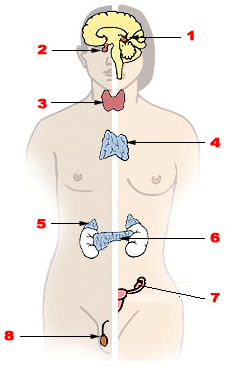Endocrine disease
| Endocrine diseases | |
|---|---|
 | |
| Major endocrine glands. (Male left, female on the right.) 1. Pineal gland 2. Pituitary gland 3. Thyroid gland 4. Thymus 5. Adrenal gland 6. Pancreas 7. Ovary 8. Testes | |
| Specialty | Endocrinology |
Endocrine diseases are disorders of the endocrine system. The branch of medicine associated with endocrine disorders is known as endocrinology.
Contents
1 Types of disease
2 List of diseases
2.1 Glucose homeostasis disorders
2.2 Thyroid disorders
2.3 Calcium homeostasis disorders and Metabolic bone disease
2.4 Pituitary gland disorders
2.4.1 Posterior pituitary
2.4.2 Anterior pituitary
2.5 Sex hormone disorders
2.6 Tumours of the endocrine glands not mentioned elsewhere
2.7 See also separate organs
3 Endocrine emergencies
4 See also
5 References
6 External links
Types of disease
Broadly speaking, endocrine disorders may be subdivided into three groups:[1]
- Endocrine gland hyposecretion (leading to hormone deficiency)
- Endocrine gland hypersecretion (leading to hormone excess)
- Tumours (benign or malignant) of endocrine glands
Endocrine disorders are often quite complex, involving a mixed picture of hyposecretion and hypersecretion because of the feedback mechanisms involved in the endocrine system. For example, most forms of hyperthyroidism are associated with an excess of thyroid hormone and a low level of thyroid stimulating hormone.[2]
List of diseases
Glucose homeostasis disorders
Diabetes
- Type 1 Diabetes
- Type 2 Diabetes
- Gestational Diabetes
- Mature Onset Diabetes of the Young
Hypoglycemia
- Idiopathic hypoglycemia
- Insulinoma
- Glucagonoma
Thyroid disorders
- Goitre
Hyperthyroidism
- Graves-Basedow disease
- Toxic multinodular goitre
- Hypothyroidism
Thyroiditis
- Hashimoto's thyroiditis
- Thyroid cancer
- Thyroid hormone resistance
Calcium homeostasis disorders and Metabolic bone disease
Parathyroid gland disorders
- Primary hyperparathyroidism
- Secondary hyperparathyroidism
- Tertiary hyperparathyroidism
Hypoparathyroidism
- Pseudohypoparathyroidism
- Osteoporosis
Osteitis deformans (Paget's disease of bone)- Rickets
- osteomalacia
Pituitary gland disorders
Posterior pituitary
- Diabetes insipidus
Anterior pituitary
Hypopituitarism (or Panhypopituitarism)
Pituitary tumors
- Pituitary adenomas
Prolactinoma (or Hyperprolactinemia)
Acromegaly, gigantism, dwarfism
- Cushing's disease
Sex hormone disorders
Disorders of sex development or intersex disorders
- Hermaphroditism
- Gonadal dysgenesis
- Androgen insensitivity syndromes
Hypogonadism (Gonadotropin deficiency)
- Inherited (genetic and chromosomal) disorders
- Kallmann syndrome
- Klinefelter syndrome
- Turner syndrome
- Acquired disorders
Ovarian failure (also known as Premature Menopause)- Testicular failure
- Inherited (genetic and chromosomal) disorders
- Disorders of Puberty
- Delayed puberty
- Precocious puberty
- Menstrual function or fertility disorders
- Amenorrhea
- Polycystic ovary syndrome
Tumours of the endocrine glands not mentioned elsewhere
Multiple endocrine neoplasia
- MEN type 1
- MEN type 2a
- MEN type 2b
- Carcinoid syndrome
See also separate organs
- Autoimmune polyendocrine syndromes
Incidentaloma - an unexpected finding on diagnostic imaging, often of endocrine glands
Endocrine emergencies
In endocrinology, medical emergencies include diabetic ketoacidosis, hyperosmolar hyperglycemic state, hypoglycemic coma, acute adrenocortical insufficiency, phaeochromocytoma crisis, hypercalcemic crisis, thyroid storm, myxoedema coma and pituitary apoplexy.[3]
Emergencies arising from decompensated pheochromocytomas or parathyroid adenomas are sometimes referred for emergency resection when aggressive medical therapies fail to control the patient's state, however the surgical risks are significant, especially blood pressure lability and the possibility of cardiovascular collapse after resection (due to a brutal drop in respectively catecholamines and calcium, which must be compensated with gradual normalization).[4][5] It remains debated when emergency surgery is appropriate as opposed to urgent or elective surgery after continued attempts to stabilize the patient, notably in view of newer and more efficient medications and protocols.[6][7][8]
See also
- List of MeSH codes (C19)
- ICD-10 Chapter IV: Endocrine, nutritional and metabolic diseases
- List of ICD-9 codes 240-279: Endocrine, nutritional and metabolic diseases, and immunity disorders
References
^ "Endocrine Disorders". webmd..mw-parser-output cite.citation{font-style:inherit}.mw-parser-output .citation q{quotes:"""""""'""'"}.mw-parser-output .citation .cs1-lock-free a{background:url("//upload.wikimedia.org/wikipedia/commons/thumb/6/65/Lock-green.svg/9px-Lock-green.svg.png")no-repeat;background-position:right .1em center}.mw-parser-output .citation .cs1-lock-limited a,.mw-parser-output .citation .cs1-lock-registration a{background:url("//upload.wikimedia.org/wikipedia/commons/thumb/d/d6/Lock-gray-alt-2.svg/9px-Lock-gray-alt-2.svg.png")no-repeat;background-position:right .1em center}.mw-parser-output .citation .cs1-lock-subscription a{background:url("//upload.wikimedia.org/wikipedia/commons/thumb/a/aa/Lock-red-alt-2.svg/9px-Lock-red-alt-2.svg.png")no-repeat;background-position:right .1em center}.mw-parser-output .cs1-subscription,.mw-parser-output .cs1-registration{color:#555}.mw-parser-output .cs1-subscription span,.mw-parser-output .cs1-registration span{border-bottom:1px dotted;cursor:help}.mw-parser-output .cs1-ws-icon a{background:url("//upload.wikimedia.org/wikipedia/commons/thumb/4/4c/Wikisource-logo.svg/12px-Wikisource-logo.svg.png")no-repeat;background-position:right .1em center}.mw-parser-output code.cs1-code{color:inherit;background:inherit;border:inherit;padding:inherit}.mw-parser-output .cs1-hidden-error{display:none;font-size:100%}.mw-parser-output .cs1-visible-error{font-size:100%}.mw-parser-output .cs1-maint{display:none;color:#33aa33;margin-left:0.3em}.mw-parser-output .cs1-subscription,.mw-parser-output .cs1-registration,.mw-parser-output .cs1-format{font-size:95%}.mw-parser-output .cs1-kern-left,.mw-parser-output .cs1-kern-wl-left{padding-left:0.2em}.mw-parser-output .cs1-kern-right,.mw-parser-output .cs1-kern-wl-right{padding-right:0.2em}
^ "Diagnosing Hyperthyroidism: Overactivity of the Thyroid Gland". endocrineweb.
^ Savage, M W; P Mah; A Weetman; J Newell-Price (1 September 2004). "Endocrine emergencies". Postgraduate Medical Journal. 80 (947): 506–515. doi:10.1136/pgmj.2003.013474. PMC 1743094. PMID 15356351.
^ Brouwers, FM; Eisenhofer, G; Lenders, JW; Pacak, K (December 2006). "Emergencies caused by pheochromocytoma, neuroblastoma, or ganglioneuroma". Endocrinology and Metabolism Clinics of North America. 35 (4): 699–724, viii. doi:10.1016/j.ecl.2006.09.014. PMID 17127142.
^ Tahim, AS; Saunders, J; Sinha, P (2010). "A parathyroid adenoma: benign disease presenting with hyperparathyroid crisis". Case Reports in Medicine. 2010: 1–4. doi:10.1155/2010/596185. PMC 3014839. PMID 21209735.
^ Newell, KA; Prinz, RA; Pickleman, J; Braithwaite, S; Brooks, M; Karson, TH; Glisson, S (August 1988). "Pheochromocytoma multisystem crisis. A surgical emergency". Archives of Surgery. 123 (8): 956–9. doi:10.1001/archsurg.1988.01400320042007. PMID 2899426.
^ Scholten, A.; Cisco, R. M.; Vriens, M. R.; Cohen, J. K.; Mitmaker, E. J.; Liu, C.; Tyrrell, J. B.; Shen, W. T.; Duh, Q.-Y. (2 January 2013). "Pheochromocytoma Crisis Is Not a Surgical Emergency". Journal of Clinical Endocrinology & Metabolism. 98 (2): 581–591. doi:10.1210/jc.2012-3020. PMID 23284003.
^ Phitayakorn, R; McHenry, CR (June 2008). "Hyperparathyroid crisis: use of bisphosphonates as a bridge to parathyroidectomy". Journal of the American College of Surgeons. 206 (3): 1106–15. doi:10.1016/j.jamcollsurg.2007.11.010. PMID 18501807.
External links
| Classification | D
|
|---|
Endocrine+system+diseases at the US National Library of Medicine Medical Subject Headings (MeSH)
MedlinePlus Overview endocrinediseases